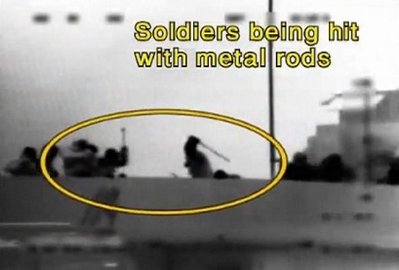UPDATES
Israeli-Turkish impasse remains as report is delayed for a third time
July 26, 2011 | Daniel Meyerowitz-Katz

While this year’s Gaza flotilla barely caused a stir, the ongoing saga of last year’s continues. Last night, the UN’s Palmer Commission confirmed rumours that the report that the release of the report they have prepared on last year’s effort will again be delayed in the hope that Israel and Turkey will settle their differences. As Herb Keinon reports in The Jerusalem Post:
The United Nations on Monday officially confirmed that the planned release Wednesday of the UN’s Palmer Commission report on the Mavi Marmara has been postponed until late August. UN spokesman Martin Nesirky gave no specific date for the much-delayed report, which officials in Jerusalem said on Sunday was now expected on Aug. 20, a Saturday.
The sources said that the report had been delayed month to allow Israel and Turkey to find a formula to renew full diplomatic ties and obviate the need to release the report. The report was originally to be released on May 15, but was postponed at the request of the Turks; and then again on July 7, another day that came and went without its release.
The report – whose details have been widely reported – upholds the legality of Israel’s naval blockade of the Gaza Strip, but takes the IDF to task for using disproportionate force in enforcing the blockade. The Turks are keen on burying the report, because while far from being a pro-Israel document, by upholding the legality of the blockade it places some of the responsibility for the flotilla fiasco on Turkey’s shoulders.
The Israelis have, thus far, refused to meet Turkey’s demand to apologise for what they believe was a legitimate act of self defence. In response, Turkey seems to be playing hardball – supporting Palestinian Authority moves that are against Israel’s interest and seemingly indicating that unless Israel capitulates, Turkey will become increasingly hostile.
For example, Turkish President Reccep Tayyip Erdogan is threatening to further freeze ties between the two nations:
According to the website of the Turkish daily Hurrieyt, Erdogan acknowledged a “Plan B” to further freeze ties with Israel if Turkey’s conditions for resolving the incident – including an Israeli apology, payment of compensation to the families of the nine victims and a lifting of the Gaza blockade – were not met by July 27, the day when the UN’s Palmer Commission was to have issued its report.
“We are going to wait for their [Israel’s] decision for a period of time. Then [if no apology comes], we will surely implement our Plan B,” Hurrieyt reported the Turkish prime minister as telling reporters Saturday at a joint press conference with Jordanian Prime Minister Marouf Bakhit.
In fact, Erdogan is also threatening to visit Gaza and increase tensions, while hinting that an Israeli apology would prevent this:
The Turkish leader hinted yesterday that if the efforts at reconciliation with Israel fail, he will visit the Gaza Strip from Egypt.
“Turkey is not interested in stirring tension by my visit to Gaza,” he said, during a press conference with the Jordanian prime minister, Marouf Bakhit. “It will be wrong to ask for an apology and at the same time visit Gaza. There are those in the Israeli government who support an apology and there are those who are opposed. I will wait for their decision and then I will carry out plan B [to visit Gaza].”
As Keinon notes, there is much suspicion in Israel that all of Erdogan’s supposed “plan Bs” are in fact “plan A” and Erdogan is merely using these statements to elicit an apology which would not end Turkish demands and, rather, would represent an admission of guilt that Turkey could later use against Israel. Whatever the case, the situation begs a serious question as to how likely reconciliation is between Israel and Turkey and how prudent it is for the UN to continue delaying the report, seemingly indefinitely, in the hope that some form of agreement may be reached. As The Jerusalem Post notes in its editorial today, Erdogan’s demands, if met, would harm Israel’s security and potentially cause violence between Gaza and southern Israel to begin to escalate out of control.
There does not seem to be much gained from apologizing. Normalization of diplomatic relations with Turkey does not appear to be in the offing, though business ties appear to remain relatively strong notwithstanding the 59 percent drop in tourism in the first five months of the year, compared to the same period in 2010.
Erdogan has said on numerous occasions that he demands nothing less than the lifting of the blockade on Gaza – a move that would make it easier for Hamas to build up its supply of rocket and mortar shells for future use against Israeli civilians.
Some similar views, opposing Israeli concessions to Turkey, come from noted Israeli strategic expert Prof. Efraim Inbar . Inbar is due to visit Australia next month.
Daniel Meyerowitz-Katz
Tags: Israel





